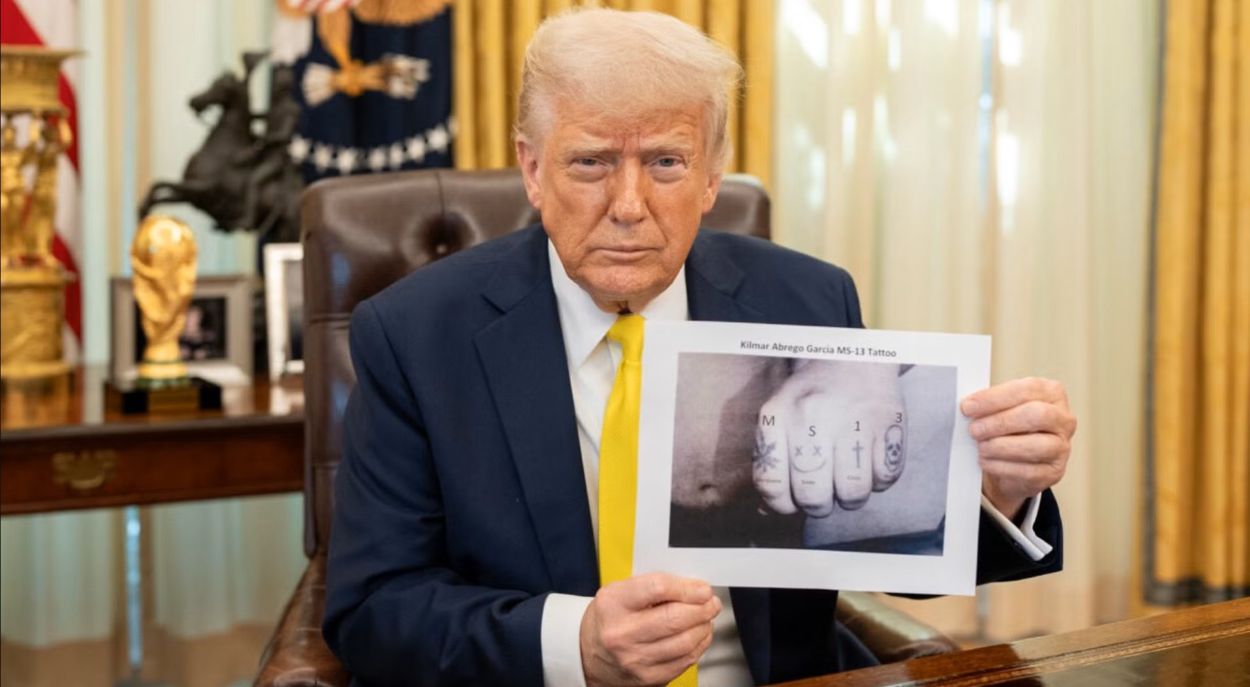On April 18, 2025, US President Donald Trump posted a black-and-white photo on social media, claiming it showed the tattooed knuckles of Kilmar Abrego Garcia, a 29-year-old deported to El Salvador in March 2025, as proof of his MS-13 gang membership.
The image, depicting “MS-13” above symbols, has drawn accusations of digital manipulation from tech experts, critics, and social media users, intensifying controversy over Abrego Garcia’s deportation.
Trump’s post, shared on April 18, 2025, accused Democrats of defending Abrego Garcia, whom he called a violent MS-13 member, citing the tattoo and court rulings. “This is the hand of the man the Democrats feel should be brought back to the United States,” Trump wrote, linking the deportation to his “Make America Great Again” agenda. However, social media users quickly flagged discrepancies, noting the “MS-13” text appeared pixelated and misaligned, suggesting Photoshop tampering. Former Minnesota state senator Linda Higgins criticised Trump on X, calling the photo an “excellent example of altering a photo.”
This is the hand of the man that the Democrats feel should be brought back to the United States, because he is such “a fine and innocent person.” They said he is not a member of MS-13, even though he’s got MS-13 tattooed onto his knuckles, and two Highly Respected Courts found… pic.twitter.com/31sNr2k1SK
— Donald J. Trump (@realDonaldTrump) April 18, 2025Older images, including TikTok videos by Abrego Garcia’s wife, show knuckle tattoos but lack the “MS-13” text, further fueling scepticism. Court documents from US Attorney General Pam Bondi reference Abrego Garcia’s alleged gang rank (“Chequeo”) and street name (“Chele”) but omit any mention of tattoos, undermining Trump’s claim.
Abrego Garcia’s Deportation
Abrego Garcia arrived in the US in 2011 at age 16, fleeing Barrio 18 gang extortion in El Salvador. He worked in Maryland construction, supporting his family of five, including two autistic children. In 2019, an anti-gang unit detained him based on a confidential informant’s claim of MS-13 affiliation. An immigration judge granted him protection, citing deportation risks, and issued a work permit. However, in March 2025, he was detained while shopping and deported within three days, despite the court order, prompting his legal team to argue the action violated US law.
Read: US Supreme Court Orders Return of Wrongfully Deported Salvadoran Man
The photo’s authenticity is scrutinised, with critics arguing it was manipulated to justify the controversial deportation. Social media sleuths and tech analysts point to lighting inconsistencies and typographic irregularities as evidence of tampering. The absence of tattoo references in official filings weakens Trump’s narrative, raising questions about the evidence used to label Abrego Garcia a gang member.
Abrego Garcia’s case highlights broader tensions in Trump’s immigration policies, particularly rapid deportations without due process. His legal team is challenging the deportation, citing the 2019 court order, while advocacy groups condemn the administration’s tactics as politically motivated.






